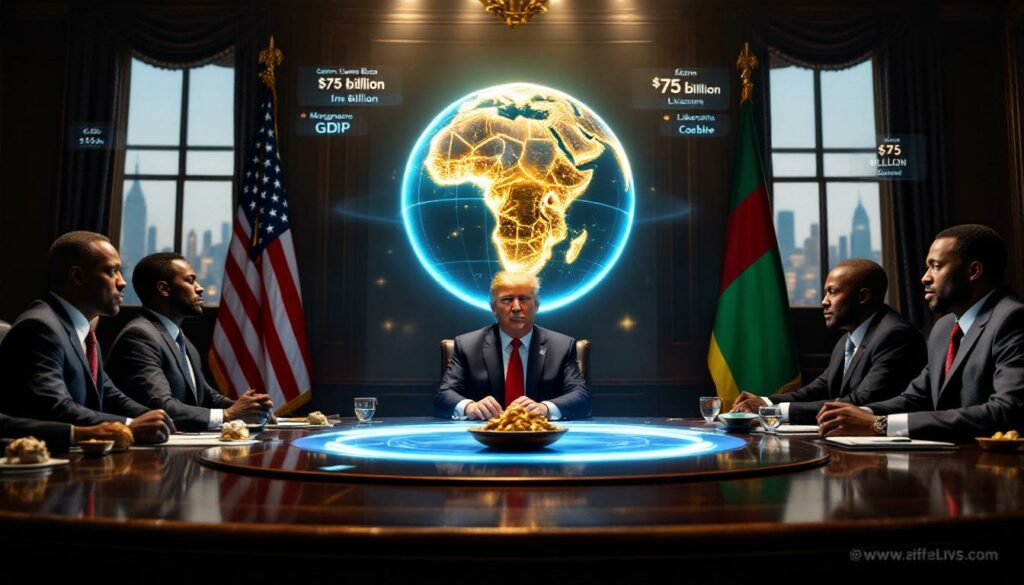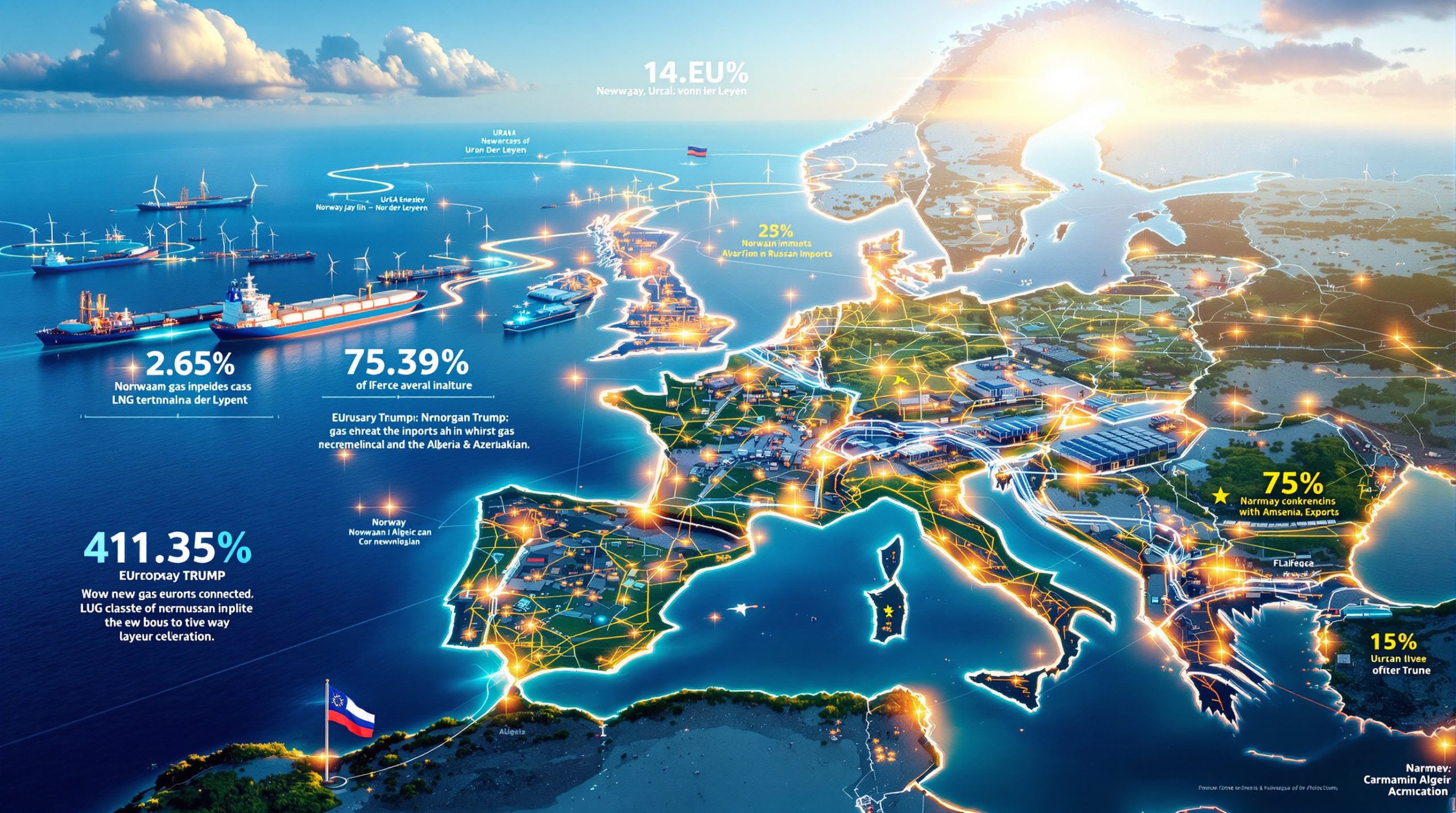Trump's African Summit: Mining Opportunities and Strategic Partnerships
The upcoming African leaders summit hosted by the Trump administration represents a pivotal shift in US-Africa relations, particularly in the mining sector. This three-day event, scheduled to begin on July 9, 2025, brings together five resource-rich African nations with significant potential for critical minerals transition and strategic partnerships.
Overview of the White House Summit
The summit will welcome leaders from five African nations: Gabon, Guinea-Bissau, Liberia, Mauritania, and Senegal. With a combined GDP of approximately $75 billion according to IMF data, these countries represent emerging economies with substantial natural resource potential rather than the continent's largest economic powers.
The gathering focuses specifically on critical minerals and natural resource opportunities for American businesses, highlighting the Trump administration's prioritization of securing vital supply chains for US manufacturing and defense industries. This strategic focus comes at a time when global competition for African resources is intensifying.
Notable Exclusions from the Invitation List
The selective nature of the invitations is particularly telling. South Africa, facing a potential 30% reciprocal tariff from the Trump administration, was notably absent from the invitation list. Similarly, Nigeria, Africa's largest oil producer and most populous nation, did not receive an invitation.
These exclusions suggest a deliberate approach to cultivating relationships with nations that offer specific strategic resources while potentially sidelining countries where diplomatic tensions exist or where Chinese and Russian influence is already deeply entrenched.
What Mineral Resources Do These African Nations Offer?
Africa's critical minerals landscape represents one of the world's last major untapped resource frontiers. The five nations participating in the summit possess significant deposits of minerals essential to modern technology, renewable energy, and defense applications.
Critical Minerals Landscape
These resource-rich nations offer a diverse portfolio of minerals crucial to US supply chains. From manganese used in steel hardening to lithium essential for battery production, the participating countries represent significant untapped potential that could reduce American dependence on other global suppliers.
The strategic importance of these resources extends beyond economic considerations. Four of the five nations (excluding Gabon) border the unstable Sahel region, creating an intersection between resource security and regional stability that adds geopolitical significance to potential partnerships.
Current production levels in these nations represent only a fraction of their potential output. With proper investment in exploration, extraction, and transportation infrastructure, these countries could substantially increase their mineral exports while developing value-added processing capabilities domestically.
Recent Investment Developments
Several major investment deals highlight the growing interest in the region's mineral potential:
-
Liberia recently secured a $1.8 billion railway agreement with Ivanhoe Atlantic Inc., creating vital infrastructure for mineral transport from the interior to coastal export facilities.
-
Gabon established a $3.8 billion pact with the African Export-Import Bank in June 2025 to fund mineral projects and related infrastructure development.
-
Guinea-Bissau signed cooperation agreements with Russia in February 2025 for resource exploration, particularly focused on bauxite, phosphate, oil, and gas.
-
Liberia has set an ambitious target of attracting $3 billion in investment for its critical minerals sector, focusing on recently documented deposits of lithium, cobalt, and rare earth elements.
"These development agreements represent just the beginning of what could become a transformative period for Africa's mineral sector," noted industry analysts at MINING.com. "The combination of resource potential and growing global demand creates unprecedented opportunities."
What Specific Opportunities Exist in Each Participating Country?
Each of the five nations brings distinct mineral assets and development opportunities to the table, creating a diverse portfolio of potential partnerships across multiple resource categories.
Gabon's Mineral Wealth
Gabon stands as the world's second-largest producer of manganese, an essential element used in steel hardening and various industrial applications. Beyond manganese, the country possesses massive high-grade iron ore deposits awaiting development.
As an OPEC member, Gabon also offers significant oil resources, providing energy security alongside mineral wealth. This combination creates opportunities for integrated resource development projects.
According to Noël Nelson Messone, Gabon's ambassador to the US: "The president of the republic is keen to see Gabon's natural resources processed locally to add value to the economy, diversify the economy and create jobs." This emphasis on local processing represents a shift from pure extraction to value-added production that could create more sustainable economic benefits.
Guinea-Bissau's Emerging Resource Sector
Although one of Africa's smaller economies, Guinea-Bissau possesses substantial bauxite deposits crucial for aluminum production and phosphate resources essential for fertilizer manufacturing. These resources have attracted interest from global mining industry evolution companies seeking to diversify their supply chains.
Recent agreements with Russia have brought United Co. Rusal International PJSC into Guinea-Bissau's mining sector, highlighting the competitive landscape for African resources. The country also has promising oil and gas exploration potential that remains largely untapped.
The development of Guinea-Bissau's resource sector faces infrastructure challenges that will require significant investment to overcome. Transportation networks, power generation, and port facilities all need expansion to support industrial-scale mining operations.
Liberia's Critical Minerals Portfolio
Liberia represents one of the summit's most promising participants, with recently announced deposits of lithium, manganese, cobalt, and neodymium—all critical components for renewable energy technologies and advanced electronics. These discoveries position Liberia as a potential supplier of minerals essential to the energy transition.
The historical US-Liberia relationship, dating back to the 19th century when the nation was founded by freed American slaves, provides a foundation for enhanced cooperation. This shared history creates cultural and diplomatic ties that could facilitate stronger economic partnerships.
The $1.8 billion railway infrastructure development agreement with Ivanhoe Atlantic Inc. demonstrates the scale of investment already flowing into Liberia's mineral sector. This railway will create a vital transportation corridor for bringing minerals from inland deposits to coastal export facilities.
Beyond minerals, Liberia offers additional opportunities in fisheries and other natural resources that could diversify economic partnerships and support sustainable development across multiple sectors.
Mauritania's Energy Transition
Mauritania recently began gas production from BP's Greater Tortue Ahmeyim development, marking its emergence as an energy producer with significant growth potential. This offshore natural gas project, shared with neighboring Senegal, represents one of Africa's largest recent energy developments.
The country has ambitious plans for gas-to-power industrialization that would utilize domestic energy resources to fuel economic diversification and manufacturing growth. This approach could create opportunities for integrated energy and mineral development projects.
A uranium project currently under assessment by the US International Development Finance Corporation highlights Mauritania's potential contribution to nuclear fuel supply chains. If developed, this project could position Mauritania as a strategic supplier for US nuclear energy programs.
Beyond established resources, Mauritania offers potential for Namibia uranium mining exploration, with geological formations similar to those hosting significant deposits elsewhere in West Africa. Preliminary surveys suggest opportunities for rare earth elements and battery minerals that warrant further investigation.
Senegal's Diversified Opportunities
Senegal recently joined the ranks of liquefied natural gas (LNG) exporters, creating a new revenue stream and energy resource for regional and global markets. This development positions Senegal as an emerging energy hub for West Africa.
The country has ambitious plans to develop over 3 gigawatts of gas-to-power capacity by 2050, reducing dependence on oil and coal for electricity generation. This transition could create opportunities for renewable energy partnerships complemented by critical minerals development.
Senegal is actively seeking $1.7 billion in investment for digital infrastructure, highlighting its focus on technological advancement alongside resource development. This digital initiative could support mining modernization and create opportunities for technological partnerships.
As one of West Africa's most stable democracies, Senegal offers a favorable business environment for long-term investment in resource development and processing facilities. Political stability provides a foundation for projects requiring substantial capital and extended development timelines.
How Does This Summit Fit into Broader US-Africa Relations?
The Trump administration's focused approach to African engagement through this summit represents a departure from previous US policy toward the continent, emphasizing strategic resources and security cooperation over broader diplomatic engagement.
Security Cooperation Potential
Four of the five participating nations border the unstable Sahel region, where increasing militant activity and political instability threaten regional security. This geographic reality creates natural security partnerships that align with US counterterrorism objectives.
The summit gains heightened importance following the 2024 closure of a key US drone base in Niger, which limited American surveillance and operational capabilities in the region. New security arrangements with strategically located partners could help restore these capabilities.
Strained relations with Burkina Faso, Mali, and Chad—countries that have experienced coups or political instability—have created security gaps in the Sahel. The summit participants could help fill these gaps through enhanced cooperation and access agreements.
These potential security partnerships would create a foundation for stable mining operations while addressing broader US strategic interests in containing extremist groups and countering Russian private military contractors operating in the region.
Economic Significance
Access to critical minerals represents a top priority for US supply chain security, particularly for technologies essential to renewable energy, defense systems, and advanced electronics. The participating nations offer resources that could reduce American dependence on potentially unreliable suppliers.
China currently dominates global production and processing of many critical minerals, creating vulnerabilities for US manufacturers. Diversifying supply sources through African partnerships aligns with broader efforts to reduce strategic dependencies.
The summit creates opportunities for American companies to establish early positions in emerging mineral provinces before competition intensifies. These first-mover advantages could secure favorable terms and resource access for decades to come.
Infrastructure development projects connected to mining operations—such as railways, ports, and power generation—offer additional investment opportunities insights that extend beyond resource extraction to create more comprehensive economic partnerships.
Strategic Positioning
The summit represents a direct response to growing Russian and Chinese influence in resource-rich African nations. Both competitors have established significant positions across the continent through state-backed companies and bilateral agreements.
By establishing new diplomatic and economic ties with these five nations, the US aims to secure access to minerals essential for technology and defense industries while limiting the expansion of geopolitical rivals in strategically important regions.
The focus on smaller, resource-rich nations rather than the continent's largest economies suggests a targeted approach to securing specific resources rather than pursuing broader market access or comprehensive trade agreements.
Building relationships with these emerging economies creates potential for long-term partnerships that could evolve beyond resources to include technology transfer, manufacturing, and security cooperation tailored to each nation's development priorities.
What Recent Developments Highlight the Importance of African Minerals?
Several recent agreements and initiatives underscore the growing recognition of Africa's critical role in global mineral supply chains and the intensifying competition for access to these resources.
Strategic Resource Agreements
Ivanhoe's $1.8 billion railway deal in Liberia, announced in July 2025, represents one of the largest infrastructure investments in West Africa focused specifically on mineral transport. This project will unlock access to deposits that previously lacked viable export routes.
Guinea-Bissau's February 2025 agreements with Russia demonstrate the willingness of global powers to engage with even smaller African nations when strategic resources are involved. These agreements covered exploration and development rights for multiple minerals.
Gabon's June 2025 funding agreement with the African Export-Import Bank provides $3.8 billion for integrated mineral development projects that include both extraction and processing facilities. This approach aims to capture more value within the country rather than simply exporting raw materials.
Liberia's ambitious $3 billion investment target for critical minerals development reflects growing confidence in the country's resource potential and improving investment climate. This target includes investments in exploration, extraction, and preliminary processing.
Global Competition for African Resources
Russian involvement in Guinea-Bissau mineral exploration highlights Moscow's strategy of seeking resource access and influence across Africa. Similar efforts are underway in Mali, Central African Republic, and other resource-rich nations.
Chinese investments across the continent have established dominant positions in cobalt (Democratic Republic of Congo) and rare earth elements (various countries). These investments often combine resource access with infrastructure development through the Belt and Road Initiative.
European nations have shown increasing interest in securing critical mineral supplies from Africa, driven by the EU Critical Raw Materials Act and ambitious targets for electric vehicle manufacturing that require substantial battery minerals.
The growing recognition of Africa's strategic importance has intensified competition and raised the stakes for successful partnerships. Countries that secure access to key mineral provinces today may enjoy significant advantages in tomorrow's technology-driven economy.
FAQs about US-Africa Mining Partnerships
Why are these specific African nations important for US mineral security?
These five nations collectively offer access to manganese, iron ore, lithium, cobalt, neodymium, bauxite, phosphate, and energy resources critical for US manufacturing, technology, and defense industries. Their combined resource portfolio addresses multiple supply chain vulnerabilities while creating diversification options for strategic minerals.
The geographic location of four participating nations near the Sahel region also provides strategic positioning for security cooperation at a time when extremist groups threaten regional stability. This combination of resource access and security partnership creates multiple benefits for US strategic interests.
Each nation offers specific advantages: Gabon as an established manganese producer, Liberia with newly discovered battery minerals, Mauritania and Senegal as emerging energy hubs, and Guinea-Bissau with bauxite and phosphate potential. Together, they represent a balanced portfolio of current production and future development opportunities.
How might Trump's tariff policies affect African mineral imports?
While Trump has announced potential tariffs on South African imports, the summit suggests a differentiated approach to African nations based on strategic importance and resource access. Countries offering critical minerals may receive preferential treatment to secure supply chains for American industries.
The absence of South Africa from the summit, despite its significant mineral production, indicates that tariff policies may be used selectively to encourage cooperation and resource access rather than applied broadly across the continent. This targeted approach allows for customized economic relationships.
For the five participating nations, tariff exemptions or reductions could provide significant competitive advantages in accessing US markets compared to other global suppliers. Such preferential treatment would incentivize increased production and dedicated supply arrangements.
Trade policies will likely be integrated with investment support and security cooperation to create comprehensive partnerships rather than focusing solely on tariff rates. This multi-faceted approach recognizes the complex challenges of developing African mineral resources.
What role do critical minerals play in US national security?
Critical minerals from these African nations are essential components in advanced technologies, renewable energy systems, and defense applications. Lithium and cobalt are crucial for energy storage, while rare earths like neodymium are irreplaceable in precision weapons and communications systems.
Securing reliable supply chains reduces US dependence on potential adversaries and supports domestic manufacturing of strategic products. Recent supply disruptions have highlighted vulnerabilities that partnerships with these African nations could help address.
The Defense Department has identified specific minerals as essential to military readiness, many of which exist in the participating countries. Developing these resources through trusted partners enhances national security while creating economic benefits for both sides.
Beyond direct defense applications, these minerals support the broader technological base that underpins US economic and military power. From semiconductors to aerospace components, critical minerals form the foundation of advanced manufacturing capabilities.
How do these partnerships compare to China's approach in Africa?
Unlike China's Belt and Road Initiative, which often focuses on infrastructure-for-resources deals with limited technology transfer, the US approach appears to emphasize direct investment in mining operations, security cooperation, and technological partnerships that may offer different benefits to African nations.
Where Chinese agreements typically involve state-owned enterprises, the US model leverages private sector investment backed by government financing and security guarantees. This approach may create more diverse economic relationships while introducing competitive market forces.
The US emphasis on environmental standards and community engagement represents another point of differentiation, with potential for more sustainable resource development that addresses local concerns. This approach may deliver fewer immediate projects but more durable long-term partnerships.
Security cooperation represents a unique American offering that China typically avoids, creating comprehensive relationships that address both economic development and regional stability concerns. This integrated approach aligns with the complex challenges facing many resource-rich African nations.
Future Outlook for US-Africa Mining Cooperation
The summit marks the beginning of what could become transformed relationships between the US and these resource-rich African nations, with potential for mutual benefits if challenges can be effectively addressed.
Potential Investment Frameworks
Direct investment in mining operations represents the most immediate opportunity, with American companies potentially gaining access to strategic resources while bringing capital, technology, and management expertise to develop African deposits efficiently and responsibly.
Public-private partnerships for infrastructure development could address the logistical challenges that have historically limited African mineral production. Railways, ports, and power generation facilities create foundations for multiple mining projects while supporting broader economic development.
Technology transfer for local processing capabilities aligns with the stated goals of several participating nations, particularly Gabon's emphasis on value addition. This approach could create more sustainable economic benefits while reducing transportation costs and environmental impacts.
Security cooperation agreements would ensure stable operations in regions facing terrorist threats or political instability. These arrangements could include training, equipment, intelligence sharing, and potentially basing rights for US forces engaged in regional security operations.
Challenges and Opportunities
Political stability concerns in the Sahel region represent the most immediate threat to successful partnerships. Spillover violence from Mali, Burkina Faso, and other troubled nations could disrupt mining operations or transportation routes if not effectively contained.
Infrastructure limitations require significant investment to overcome, with power generation, transportation networks, and port facilities all needing expansion to support industrial-scale mining. These infrastructure gaps create both challenges and investment opportunities.
Competition from China, Russia, and European nations means the US must offer compelling partnerships that deliver clear benefits to African nations. This competitive landscape will likely improve terms for African countries while creating pressure for expedited project development.
Despite these challenges, the potential for transformative economic development through responsible resource extraction creates powerful incentives for successful partnerships. With proper management
Ready to Capitalise on the Next Mineral Discovery?
Stay ahead of the market with Discovery Alert's proprietary Discovery IQ model, delivering instant notifications on significant ASX mineral discoveries that could mirror the substantial returns seen in African resource projects. Explore how major mineral discoveries can lead to exceptional investment outcomes by visiting Discovery Alert's dedicated discoveries page.




